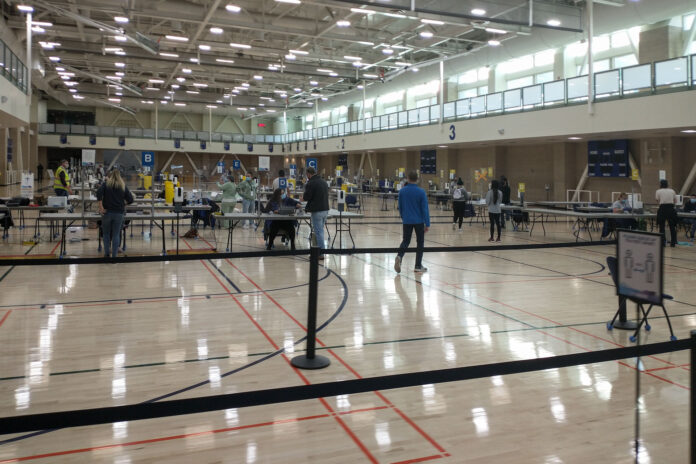Positivity rates have been averaging around 1% since the Thursday before Picnic Day
By KATHLEEN QUINN— campus@theaggie.org
COVID-19 cases had a sharp uptick right before Picnic Day on April 23, when community members from Davis and the surrounding areas arrived in the thousands to take part in UC Davis’ on-campus activities.
Since then, the cases have risen to a 1.5% positivity rate, with on-campus quarantine hovering at 35% capacity.
Yakov Perlov, a fourth-year psychology major, contracted COVID-19 on April 13 after being exposed to the virus by his fiancé.
“The week after I got COVID was when we had to do midterms,” Perlov said. “Thankfully, all of the assignments that I had to do were online that week.”
UC Davis dropped its mask mandate at the beginning of the spring quarter but still highly encourages masking indoors as of March 19.
Perlov said in his experience, the majority of students in his classes have not been wearing masks.
“I think there were maybe a quarter of students wearing masks,” Perlov said.
Kris Jayme Matas, a fifth-year community and regional development major, said in their classes, mask-wearing diminished as the quarter progressed.
“Originally, one of my professors walked into the classroom without wearing one and then saw all the students in masks and was like, ‘Oh, okay, I guess I’ll wear one too,’ which was great,” Matas said. “But I’ve noticed as the quarter has gone on, less and less people are wearing them.”
The Centers for Disease Control recently reinstated a mask mandate on public transportation, citing the spread of the omicron BA.2 variant.
Matas said they feel strongly about providing remote accommodations as a student with a disability. They have worked with other students with disabilities to develop a Higher Ed COVID Policy Report Card, which recently graded UC Davis with a “D.” Scores are based on a survey that asked students, faculty and staff of higher education institutions to rate universities based on mask mandates, test mandates, vaccine mandates and remote options which are then fact-checked by looking at official documents and statements by each school.
“We’re finding that a lot of schools are dropping more and more mandates,” Matas said. “They’re becoming less transparent about what’s going on on campuses and yet, many of them are having these surges due to the BA variant.”
Andy Fell, a news and media relations specialist at UC Davis, said the university is aware of the increase in cases and is keeping an eye on it.
“We will monitor the situation and take action if appropriate, as we have before,” Fell said.
A statement by Healthy Davis Together on April 26 acknowledged the recent increase in transmission of COVID-19 within the greater Yolo County community, as shown by wastewater reports.
The decision to continue online education during the first few weeks of winter quarter was made after cases jumped to 4.3%, with a seven-day average of close to 800 cases. The current numbers according to the UC Davis COVID-19 dashboard are not as high, at 252 cases within the past seven days, but they are still higher than at any other time since the last spike in January 2022.
Heather Ringo, a second-year Ph.D. candidate in English, is currently using the Planned Educational Leave Program after finding that repeatedly requesting accommodations compromised her health.
“I’ve spent well over 100 hours,” Ringo said. “I stopped keeping track because I was so depressed by how much labor I was spinning away trying to get accommodations despite the fact that I have four documented accommodations with [the Student Disability Center] and [Disability Management Services] to get remote learning and teaching.”
The pursuit of remote options by members of the UC Davis student body has been an ongoing issue, previously leading to a petition by students, faculty and staff in January that garnered over 9,000 signatures.
Remote options for students with disabilities remain a top priority, according to Sarah Theubet, a fourth-year communications major and the president of the Disability Rights and Advocacy Committee (DRAC).
“Because we are so used to having to fight for every access need, we are the people who are paying attention to the numbers,” Theubet said. “We’re checking the wastewater statistics versus what Davis is putting out. We’re doing all of these things so we know how to stay safe ourselves, but no one will listen to us.”
Perlov said his professors were largely supportive when he reported his positive case, but there were some limitations.
“Of the two classes I have in person, one of them does not do recordings of any sort, so if you miss [a] lecture it’s just too bad,” Perlov said, “which is why I went to campus in the first place. I didn’t want to miss a lecture before I found out I was positive.”
In a statement from the chancellor’s office on Feb. 11, Chancellor Gary May said that the university continues to weigh all of the data and consult with experts and campus leaders when making decisions that impact everyone at the university.
The UC Davis officials have cited COVID-19 as becoming endemic and have relaxed guidelines. Theubet said it may be that people are simply succumbing to COVID-19 fatigue.
“They don’t want to think about it anymore so they are all just feeding this ignorance around the whole thing,” Theubet said.
Written by: Kathleen Quinn — campus@theaggie.org








